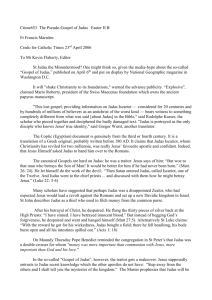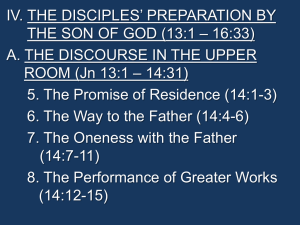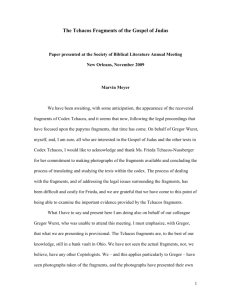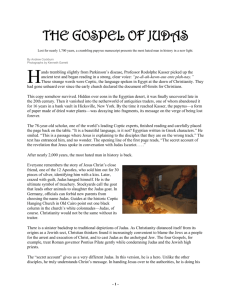Reflections on Judas Iscariot, Sophia, and the Apostle Peter
advertisement
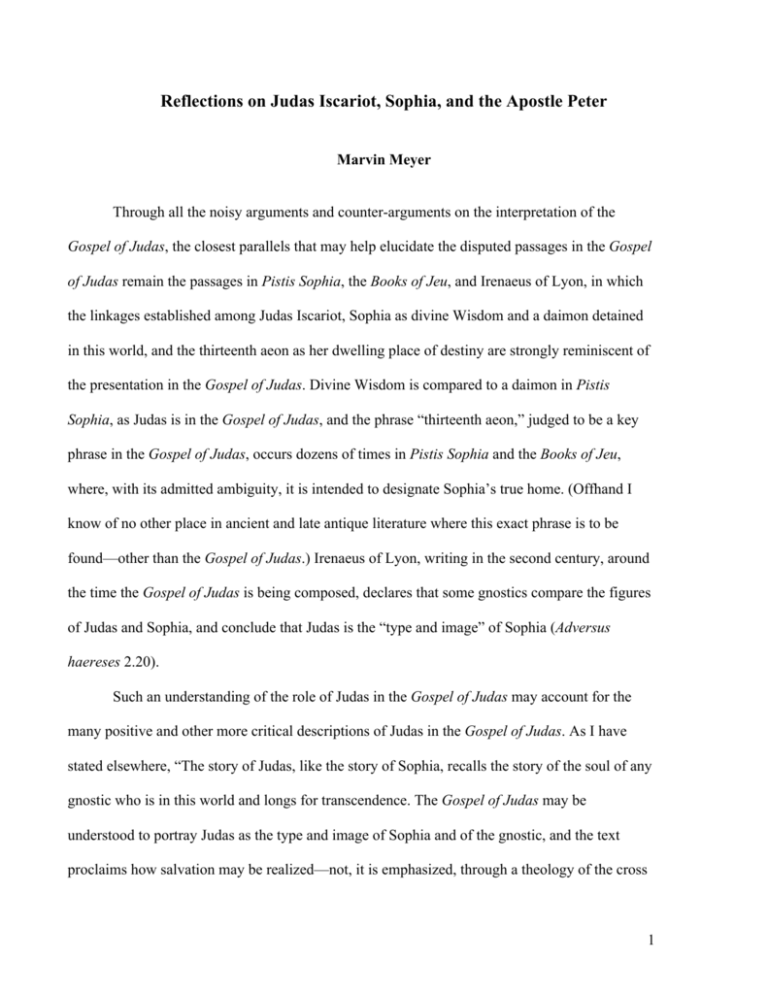
Reflections on Judas Iscariot, Sophia, and the Apostle Peter Marvin Meyer Through all the noisy arguments and counter-arguments on the interpretation of the Gospel of Judas, the closest parallels that may help elucidate the disputed passages in the Gospel of Judas remain the passages in Pistis Sophia, the Books of Jeu, and Irenaeus of Lyon, in which the linkages established among Judas Iscariot, Sophia as divine Wisdom and a daimon detained in this world, and the thirteenth aeon as her dwelling place of destiny are strongly reminiscent of the presentation in the Gospel of Judas. Divine Wisdom is compared to a daimon in Pistis Sophia, as Judas is in the Gospel of Judas, and the phrase “thirteenth aeon,” judged to be a key phrase in the Gospel of Judas, occurs dozens of times in Pistis Sophia and the Books of Jeu, where, with its admitted ambiguity, it is intended to designate Sophia’s true home. (Offhand I know of no other place in ancient and late antique literature where this exact phrase is to be found—other than the Gospel of Judas.) Irenaeus of Lyon, writing in the second century, around the time the Gospel of Judas is being composed, declares that some gnostics compare the figures of Judas and Sophia, and conclude that Judas is the “type and image” of Sophia (Adversus haereses 2.20). Such an understanding of the role of Judas in the Gospel of Judas may account for the many positive and other more critical descriptions of Judas in the Gospel of Judas. As I have stated elsewhere, “The story of Judas, like the story of Sophia, recalls the story of the soul of any gnostic who is in this world and longs for transcendence. The Gospel of Judas may be understood to portray Judas as the type and image of Sophia and of the gnostic, and the text proclaims how salvation may be realized—not, it is emphasized, through a theology of the cross 1 and the experience of sacrifice, but on the contrary through gnosis and insight into the nature of the divine and the presence of the divine in the inner lives of people of knowledge.” I have attempted to develop aspects of this interpretation in the essay “The Thirteenth Daimon: Judas and Sophia in the Gospel of Judas” (available here), in the paper presented at the conference on the Gospel of Judas and Codex Tchacos at Rice University (“When the Sethians Were Young: The Gospel of Judas in the Second Century”), and in the revised edition of The Gospel of Judas published by National Geographic. Recently I have also noted a similar identification of divine Wisdom as a daimon in Pseudo-Tertullian, Adversus omnes haereses 1.2, in the context of the discussion of Simon Magus, who is said to have come into this world on behalf of an erring daimon (daemonem), who is Wisdom (sapientia). The entire passage reads as follows: “Of these (heretics) the first of all is Simon Magus, who in the Acts of the Apostles earned a condign and just sentence from the Apostle Peter. He had the hardihood to call himself the Supreme Virtue, that is, the Supreme God; and moreover, (to assert) that the universe had been originated by his angels; that he had descended in quest of an erring daemon, which was Wisdom; that, in a phantasmal semblance of God, he had nor suffered among the Jews, but was as if he had suffered” (ANF). A comparable argument about a “Judas-Achamoth typology” in the Gospel of Judas and elsewhere has been made in an unpublished paper of Tage Petersen, “The Gospel of Judas: Some Suggestions,” given at the Nordic Nag Hammadi and Gnosticism Network Seminar, held in Cairo on October 27-November 5, 2007. I would hope that colleagues will continue to pursue this fruitful line of interpretation. Speaking of the Apostle Peter, it may also be helpful for the interpretation of the Gospel of Judas to observe the similarities between Peter in the New Testament gospels and Judas 2 Iscariot in the Gospel of Judas. If Peter is the leading disciple in the New Testament synoptic gospels, so is Judas the leading disciple in the Gospel of Judas, and Peter in the synoptic gospels and Judas in the Gospel of Judas each have the correct confession of who Jesus is in the gospels in which they are featured (Mark 8:27-33; Matthew 16:13-23; Luke 9:18-22; Judas 35). Like Peter, Judas too has issues and problems, and if Jesus can turn to Peter in Mark and Matthew and tell him, “Get behind me, Satan” (Mark 8:33; Matthew 16:23), he can refer to Judas in the Gospel of Judas as the “thirteenth daimon (or demon)” (44). Peter denies Jesus, Judas hands him over to the authorities, with similar language in the two instances. In the Gospels of Mark, Matthew, Luke, and John those around Peter at the time of his denial comment that he was with Jesus and is one of them (that is, one of the disciples; compare Mark 14:66-72; Matthew 26:6975; Luke 22:54-62; John 18:15-27). In the Gospel of Judas the scribes say to Judas, “What are you doing here? You are Jesus’ disciple” (58). In time, Peter ends up in St. Peter’s Church in Rome and Judas is in the lowest circle of Dante’s hell with Brutus and Cassius—yet in their respective texts they are the first among the disciples of Rabbi Jesus. Thus, Rodolphe Kasser writes of Judas in The Gospel of Judas, “We smile at the educational dialogues of the ‘Master’ (Rabbi) with his disciples of limited spiritual intelligence, and even with the most gifted among them, the human hero of this ‘Gospel,’ Judas the misunderstood—whatever his weaknesses” (78). Finally, at the conclusion of the Gospel of Judas, someone enters a cloud of light, and it is becoming increasingly apparent that it is most likely Jesus who enters, as Sasagu Arai initially suggested to me over some especially inspiring sushi at lunch in Tokyo a couple years ago. Now Gesine Schenke Robinson and Birger Pearson, among others, agree. If this is the case, then the cloud of light is an undeniably good cloud, and this may suggest that when Judas’ star approaches the luminous cloud, this is good news. The scene, with the stars around the cloud of 3 light into which Jesus enters, may resemble an enthronement scene, and as Jesus tells Judas, “The star that leads the way is your star” (57). It may be that just as Judas leads in his profession about Jesus near the beginning of the Gospel of Judas, he also leads in his witness to the ascension of Jesus at the end. In the meantime, we continue to struggle with the interpretation of the Gospel of Judas, and we eagerly await the appearance of the additional fragments of Judas and Codex Tchacos, which will undoubtedly shed more light on this challenging and beguiling text. 4

